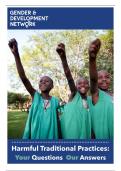Harmful Traditional Practices:
Your Questions, Our Answers
,1. What are Harmful Traditional
Practices and where do they
come from?
Harmful Traditional Practices are a form of discrimination;
they violate the human rights of affected individuals,
particularly women and girls. They arise from gender
inequality and discriminatory values, which lead to
unequal power relations in communities and societies and
to violence against women and girls.
There is no clear and universally agreed deinition of Harmful Traditional Practices (HTPs). HTPs
stem from value-based discrimination against particular groups of people, and they challenge the
human rights of the people affected by them. The roots of HTPs are in particular cultural and social
norms and beliefs, and particular interpretations of religion. These lead to unequal power relations
between women and men (gender inequality), and male domination throughout society. There is
some contention about the inclusion of ‘traditional’ when looking at harmful practices, but the full
term ‘harmful traditional practices’ acknowledges that HTPs come from a long-standing traditional
background. This allows the harmful nature of HTPs to be addressed, while respecting and
working within the context of that tradition.
Social norms are beliefs, held by groups of people, about the way they must
act to be an accepted member of society. Social norms are the “unwritten rules” that show the
values that a society holds dear and that govern how people should behave in a given context or
situation. Not to keep within the social norms would mean being isolated or excluded by society.
2. Who is affected by HTPs?
Because of gender inequalities, it is mostly girls and
women who are affected by HTPs
Harmful Traditional Practices can affect men and women, girls and boys. However, because the
causes of HTPs lie in deep-rooted gender inequalities, girls and women are the most affected.
Because HTPs are about gender, they affect girls and women across societies, not just those who
are most poor. Poverty, and other disadvantages such as living with disabilities, may also make
the effects of HTPs worse. HTPs are as varied as the cultures in which they occur, but the majority
of HTPs are related to widespread social understanding of what it means to be a girl or woman, to
the control of women’s sexuality and to notions about girls’ ‘purity’. HTPs are used to reinforce the
lower status attributed to women and girls in many societies, and are enforced as a way to keep
women and girls in subordinate roles.
2
,© Islamic Relief Worldwide
, 3. What kinds of HTPs exist?
There are hundreds of different forms of HTPs. In this
publication, we focus on two widespread HTPs: Female
Genital Mutilation/Cutting (FGM/ C ) and child marriage.
The International NGO Council argues that the term HTPs should be expanded beyond the
concept of ‘tradition’ to incorporate practices that are based on culture, patriarchal or male-
controlled interpretations of religious texts, or superstition. HTPs are linked to forms of violence
against women and include, but are not limited to, Female Genital Mutilation/Cutting (FGM/C),
child marriage, son preference, bride-price, dowry payments and honour-killings. These practices
continue to grow and evolve through globalisation and migration, with many of them being
transferred to new countries. There is some evidence that recent extremist interpretations of
religion may also lead to an increase in HTPs. In this publication, we will focus on FGM/C and
child marriage, which are widespread and cause great harm to girls and women. We also give
brief descriptions of four other common HTPs.
4. Are all traditional practices
harmful?
There are many positive traditional practices. These offer
social beneits and need to be protected when working to
end HTPs.
No, many traditional practices are positive. These include practices that promote social solidarity
and equity in communities. For example, in many Arab societies it is a traditional practice to foster
orphaned children and, in many cultures, communities traditionally group together to identify and
protect particularly poor and vulnerable people. In Rwanda, the concept of Ubudehe ensures that
communities work together to protect themselves and their environment – it is believed that the
well-being of individuals is dependent on the well-being of the community as a whole. In many
East and West African countries, and in parts of the Middle East and Asia, communities use social
saving systems.
The problem is that, where HTPs exist, societies also believe that they are necessary to improve
the well-being of the whole community. For example, the vast majority of parents do not put their
daughters through FGM/ C or child marriage because they wish to do them harm, but often because
they believe that FGM/C is necessary to secure their daughters a good marriage, a good future,
and acceptance into their community. The challenge is to ind ways to respect different cultures,
and protect positive traditions, at the same time as encouraging social change away from harmful
practices that deny girls and women their human rights.
4





